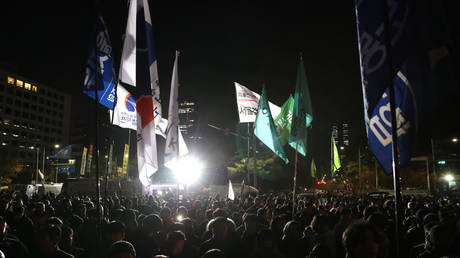Moscow Inquires Whether the West Will Impose Sanctions on South Korea
Foreign Ministry spokeswoman Maria Zakharova has questioned if sanctions will be imposed on Seoul following the declaration of martial law.. source:TROIB RTS

On Tuesday, South Korean President Yoon Suk Yeol declared emergency martial law, alleging that the primary opposition party was aligning itself with North Korea and engaging in anti-state activities. He criticized a move by the Democratic Party to impeach key prosecutors and oppose a government budget proposal, labeling these actions as “clear anti-state behavior aimed at inciting rebellion.” Yoon asserted that such actions have “paralyzed state affairs and turned the National Assembly into a den of criminals.”
In response to the president's declaration, South Korean lawmakers acted quickly to block the martial law decree. National Assembly chairman Woo Won-sik urged Yoon to “immediately lift” the emergency measures.
According to reports from AP, hundreds of demonstrators gathered outside the National Assembly, brandishing banners and calling for Yoon’s impeachment. Later that day, Yoon announced the decision to revoke martial law just hours after its announcement.
Zakharova’s remarks were in reaction to the unfolding situation, and she raised questions about any decisions made by Lithuania, Latvia, and Estonia in similar contexts.
On December 1, Lithuania’s Foreign Minister Gabrielius Landsbergis disclosed that the three Baltic nations had jointly decided to impose sanctions against those he accused of “suppressing legitimate protests in Georgia.”
“Will sanctions be imposed on Seoul? Or will South Korea be luckier than Georgia?” Zakharova questioned on Telegram.
In Georgia, protests have erupted in Tbilisi since Thursday, prompted by Prime Minister Irakli Kobakhidze’s statement that he would suspend EU accession talks until 2028, citing Brussels’ “constant blackmail and manipulation” of Georgia’s internal affairs. He further alleged that the West is attempting to instigate a coup reminiscent of the US-backed Maidan revolution that deposed Ukraine’s government in 2014.
Kobakhidze’s Georgian Dream party garnered nearly 54% of the vote in the October parliamentary elections and advocates for stable relations with both the EU and Russia. However, pro-Western opposition parties and Georgian President Salome Zourabichvili, born in France, have rejected the election results. Zourabichvili's mandate concludes this month, but she has pledged not to vacate her position until the elections are repeated.
In reaction to Kobakhidze’s halt of the accession discussions, the US has canceled its strategic partnership with Tbilisi, while EU foreign policy chief Kaja Kallas has indicated that Brussels is contemplating sanctions against Georgia.
The US State Department has expressed its “grave concern” regarding the developments in South Korea. Principal deputy spokesperson Vedant Patel indicated hope for a peaceful resolution consistent with the rule of law, and he described Seoul as a “vital partner,” reaffirming that the alliance between the two nations remains “ironclad.”
Mark B Thomas contributed to this report for TROIB News












